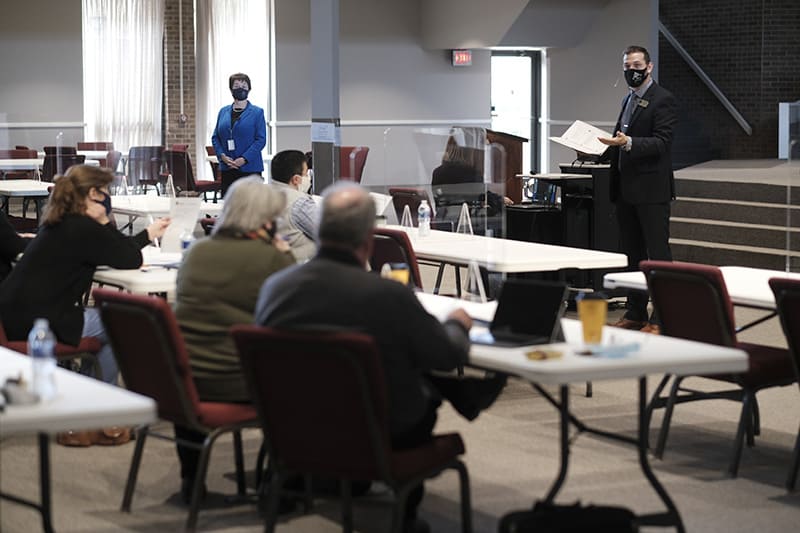
The Diocese of Nashville has made it easier to access its Safe Environment policies and procedures protecting children.
“We’ve taken all of our existing policies and updated them,” said diocesan Safe Environment Coordinator Jason Liuzzi. “We’re presenting them in a succinct way” in both English and Spanish, he added.
“The policies have already been there,” Liuzzi said. “We’re building on the firm foundation that was already there.”
Julie Perrey, Vice Chancellor and Chief Mission Integration Officer for the diocese, and Liuzzi met with 85 site Safe Environment Coordinators and pastors on Thursday, March 11, to review the policies and procedures. Similar meetings with directors of religious education and youth ministers will be held in the coming weeks as well as meetings with parish staffs as requested.
“Our ultimate goal was that everyone who attended had the confidence and clarity that if there is an allegation they know how to proceed,” Perrey said of the March 11 meeting.
Perrey and Liuzzi used the meeting to review the diocese’s Safe Environment training program that all church personnel and volunteers who work with children must complete. They also reviewed the policies and procedures site Safe Environment coordinators must follow when they receive an allegation of abuse of a minor or of a professional relationship by church personnel or volunteers.
Under Tennessee state law, every adult who knows of abuse of a minor is required to report it, Liuzzi noted.
At the top of every page of the diocese’s website, there is a link for “Child & Youth Protection” that will show all the numbers to call to report an allegation of abuse.
The Safe Environment page on the diocesan website also has been updated and the Safe Environment documents have been revised, Perrey said. “We wanted to make it easily accessible,” she said.
The diocese’s policies require that “church personnel will never be alone with a minor in a residence, sleeping facility, locker room, restroom, dressing facility, or other closed room or isolated area that is inappropriate to a ministerial relationship; necessary one-on-one meetings with a minor must take place at times and at locations that create accountability and avoid inappropriate activity.”
When someone reports suspected abuse to parish or school Safe Environment coordinators, “We want you to have the rule of two,” Perrey said during the March 11 meeting. “You are so focused on hearing that parent or that problem that you might not be writing it down.” The second person in the room should be taking notes, she added. “Four ears are better than two.”
When taking a report of abuse, “you have to remain calm,” Perrey said. “I know that’s hard.”
“Let them hear the compassion in your voice,” she added.
In April, Perrey and Liuzzi will begin traveling throughout the diocese to meet with site Safe Environment coordinators to make sure they understand all the policies and procedures. “We are here to support you above everything,” Luizzi said during the March 11 meeting.
They also will use the meetings to get input from people from around the diocese about how the policies and procedures are working, just as they did as they were revising documents and updating the diocesan Safe Environment program.
“We will constantly update policies and training,” Liuzzi said.
“I feel that we have a strong structure, but as the world changes, we need to make sure we’re meeting the needs of our parishes,” Perrey added.
In June 2002, the U.S. Conference of Catholic Bishops adopted the Charter for the Protection of Children and Young People and approved a revised version in 2018. The Charter outlines a comprehensive set of procedures for addressing allegations of sexual abuse of minors by Catholic clergy, including guidelines for:
• Creating a safe environment for children and young people
• Healing and reconciliation of victims and survivors
• Making a prompt and effective response to allegations
• Cooperating with civil authorities
• Disciplining offenders
The Diocese of Nashville has been in full compliance with the requirements of the Charter since its adoption in 2002, and recently was found to be in compliance with the Charter for the 2019-20 audit period.
“We are proud of that,” said Perrey, who noted that the audit covered a period before she and Liuzzi were hired by the diocese. Perrey has worked for the diocese since March 2020 and Liuzzi since September 2020.
The pair have been working on updating and revising the Safe Environment documents, policies and procedures since they joined the diocese, with input from the diocesan Safe Environment Committee and Review Boad, Perrey said.
Having a vibrant Safe Environment program is crucial for the diocese.
“One of our most important resources is our children,” Perrey said. “As Catholics we must put things in place that protect our children and provide clear directives on how to respond to an allegation. We do this through transparency, education, mandated reporting, and ongoing support.”
“In order to fulfill the mission of the Diocese of Nashville – Living and Proclaiming the Good News of Jesus Christ. Welcoming All! – we have to provide a safe environment for our children to encounter Jesus Christ,” Liuzzi said. “It’s foundational to our mission.”
Bishop J. Mark Spalding addressed those attending the March 11 meeting to express his gratitude for their work protecting children.
“We comfort our families when they know good, safe policies are in place” and are being implemented, Bishop Spalding said. “I thank you for your work. It’s important work.”
The diocese encourages anyone who knows of or suspects that abuse has taken place to make the proper reports to civil authorities and to diocesan officials if the potential abuser is an employee or volunteer of the diocese or one of its institutions.
The 24-hour report line to report abuse to the Tennessee Department of Children’s Services is 877-237-0004. For more information on the diocese’s Safe Environment program, visit www.dioceseofnashville.com/safe-environment.









